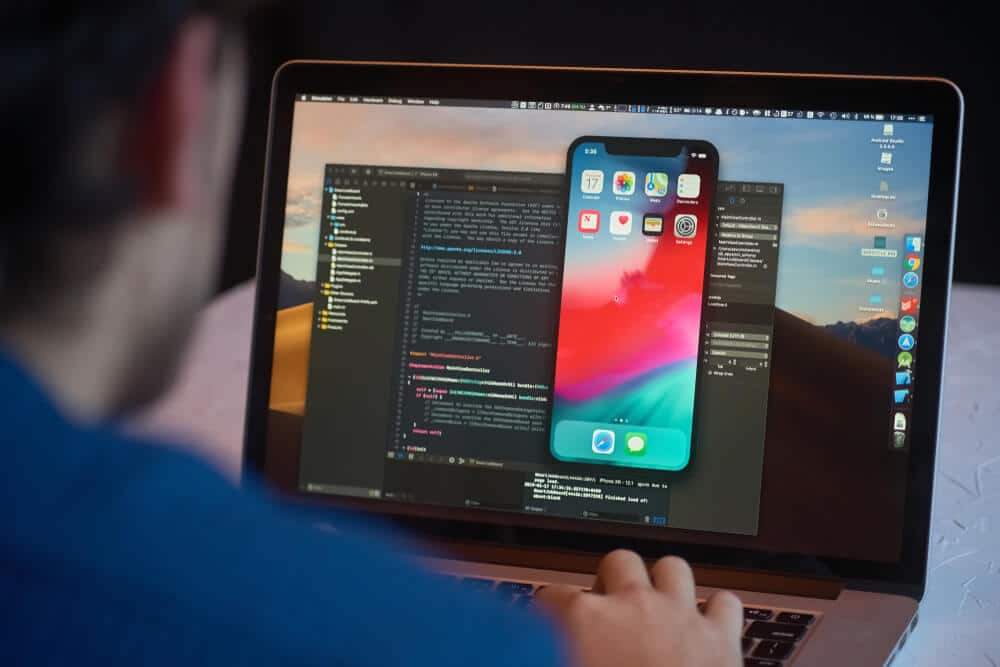Are you considering developing your first iOS app but unsure which software to use? Several iOS app development software is available in the market, making choosing the right one for your project challenging. However, selecting the best software for iOS app development is critical for creating a user-friendly, engaging, and scalable app.
This blog will discuss the best iOS app development software to help you develop your first iOS app. We will cover their features, pricing, and benefits, making an informed decision easier.
Best iOS App Development Software
From Xcode to Flutter, Adobe PhoneGap to Felgo, a range of top iOS app development software is available to help developers build powerful and engaging apps for the App Store.
Xcode
Xcode is Apple’s official Integrated Development Environment (IDE) for iOS app development. It is an excellent software for developing iOS apps and provides a range of features such as a code editor, debugger, and simulator. Xcode supports several programming languages, such as Swift, Objective-C, C++, and more.
Xcode offers a user-friendly interface, making it easy for developers to create and manage projects. It also provides features such as Interface Builder, which helps design the app’s user interface, and Test Navigator, which helps test the app.
Pricing: Xcode is free software and can be downloaded from the Apple App Store.
AppCode
AppCode is another popular iOS app development software developed by JetBrains. It is an excellent tool for iOS app development, especially for those who prefer using alternative programming languages such as Java, Kotlin, and Python.
AppCode offers a range of features, such as syntax highlighting, code completion, and code inspections. It also provides an integrated debugger and a built-in terminal for running scripts.
Pricing: AppCode offers a 30-day free trial starting at $199 annually.
CodeRunner
CodeRunner is a lightweight and flexible iOS app development platform suitable for developers who prefer a simple and intuitive interface. It supports several programming languages like Swift, Objective-C, Python, Ruby, and more.
CodeRunner provides a range of features, such as syntax highlighting, code completion, and debugging tools. Additionally, it offers built-in support for several frameworks and libraries, making integrating them into the app easier.
Pricing: CodeRunner offers a 7-day free trial starting at $19.99.
React Native
React Native is a popular open-source iOS app development framework developed by Facebook. It allows developers to build high-performance, scalable, cross-platform apps using JavaScript.
React Native offers a range of features, such as hot reloading, which helps instantly preview the changes made in the app’s user interface. Additionally, it provides a rich set of components, making it easier to create a visually appealing app.
Pricing: React Native is free software and can be downloaded from its official website.
Xamarin
Xamarin is a popular iOS app development software suitable for developers who prefer C# programming. It offers a range of features, such as a code editor, debugger, and simulator.
Xamarin provides a rich set of components, making creating a visually appealing app easier. Additionally, it offers built-in support for several frameworks and libraries, making integrating them into the app easier.
Pricing: Xamarin offers a 30-day free trial, and its pricing starts at $999 per year.
Adobe PhoneGap
Adobe PhoneGap is a popular cross-platform mobile app development framework that uses web technologies like HTML, CSS, and JavaScript. It allows developers to build mobile apps for multiple platforms, including iOS, Android, and Windows. PhoneGap provides access to native device APIs, enabling developers to add native functionality to their apps.
Pricing: PhoneGap is open-source and free to use.
Ionic
Ionic is a popular open-source mobile app development framework that uses web technologies like HTML, CSS, and JavaScript. It allows developers to build hybrid mobile apps for multiple platforms, including iOS, Android, and the web. Ionic offers a wide range of pre-built UI components, making it easier to build visually appealing apps quickly.
Pricing: Ionic is open-source and free to use. However, it offers additional features and support through paid plans, which start at $19 per month.
Sencha Touch
Sencha Touch is a cross-platform mobile app development framework that uses web technologies like HTML, CSS, and JavaScript. It allows developers to build mobile apps for multiple platforms, including iOS and Android. Sencha Touch offers a range of pre-built UI components and animations, making it easier to create visually appealing apps quickly.
Pricing: Sencha Touch offers a 30-day free trial starting at $2,625 annually.
Kony AppPlatform
Kony AppPlatform is a popular cross-platform app development platform that allows developers to build native, hybrid, and web apps for iOS, Android, and other platforms. It offers a range of pre-built components and templates, making it easier to build apps quickly. Kony AppPlatform provides a visual app builder, allowing users to create apps without writing any code.
Pricing: Kony AppPlatform offers a 30-day free trial of $15,000 annually.
Xojo
Xojo is a popular cross-platform app development tool that allows developers to build native apps for iOS, macOS, and other platforms using a single codebase. Xojo uses a drag-and-drop interface, making it easier to build apps without writing any code. Additionally, Xojo provides a range of pre-built components and a visual UI editor, making it easier to create visually appealing apps quickly.
Pricing: Xojo offers a 90-day free trial, and its pricing starts at $299 per year.
Swiftic
Swiftic is a popular no-code app development platform allowing users to build iOS and Android apps without coding experience. Swiftic offers a range of pre-built templates and components, making it easier to build apps quickly. Swiftic provides various marketing tools, allowing users to promote their apps and increase downloads.
Pricing: Swiftic offers a 14-day free trial, starting at $41 monthly.
AppSheet
AppSheet is a popular no-code app development platform that allows users to build custom iOS and Android apps using spreadsheets as a data source. AppSheet offers a range of pre-built templates and components, making it easier to build apps quickly. AppSheet provides various data analysis tools, allowing users to gain insights from their app data.
Pricing: AppSheet offers free and paid plans starting at $5 per monthly user.
Appery.io
Appery.io is a popular cloud-based app development platform that allows developers to build hybrid mobile apps for multiple platforms, including iOS and Android. Appery.io offers a range of pre-built components and a visual UI editor, making it easier to build apps quickly. Additionally, Appery.io provides access to native device APIs, enabling developers to add native functionality to their apps.
Pricing: Appery.io offers a 30-day free trial starting at $60 monthly.
PhoneGap
PhoneGap is a popular open-source app development framework that allows developers to build hybrid mobile apps for multiple platforms, including iOS and Android, using web technologies such as HTML, CSS, and JavaScript. PhoneGap offers a range of pre-built components and a visual UI editor, making it easier to build apps quickly. Additionally, PhoneGap provides access to native device APIs, enabling developers to add native functionality to their apps.
Pricing: PhoneGap is open-source and free to use.
Appcelerator
Appcelerator is a popular cross-platform app development platform that allows developers to build native iOS and Android apps using JavaScript. Appcelerator offers a range of pre-built components and a visual UI editor, making it easier to build apps quickly. Additionally, Appcelerator provides access to native device APIs, enabling developers to add native functionality to their apps.
Pricing: Appcelerator offers a free trial starting at $99 per month.
Firebase
Firebase is a popular mobile app development platform that allows developers to build high-quality iOS and Android apps quickly and easily. Firebase offers a range of features, including a real-time database, cloud storage, authentication, and analytics, making it easier to build and manage apps. Additionally, Firebase provides a range of pre-built UI components and a visual app builder, allowing users to create apps without writing any code.
Pricing: Firebase offers free and paid monthly plans starting at $25.
Adobe XD
Adobe XD is a popular design and prototyping tool that allows designers and developers to create and preview iOS app designs quickly and easily. Adobe XD offers a range of design tools, including wireframing, prototyping, and vector design, making it easier to create visually appealing app designs.
Pricing: Adobe XD offers free and paid monthly plans starting at $9.99.
Corona SDK
Corona SDK is a popular open-source app development framework that allows developers to build mobile apps for multiple platforms, including iOS and Android, using the Lua programming language. Corona SDK offers a range of pre-built components and a visual UI editor, making it easier to build apps quickly. Additionally, Corona SDK provides access to native device APIs, enabling developers to add native functionality to their apps.
Pricing: Corona SDK is open-source and free to use. Corona Enterprise, the platform’s premium offering, starts at $79 monthly.
Appy Pie
Appy Pie is a popular no-code app development platform that allows users to build custom iOS apps without writing any code. Appy Pie offers a range of pre-built components and a visual app builder, making it easier to build apps quickly. Additionally, Appy Pie provides a range of features, including push notifications, social media integration, and e-commerce functionality, making it easier to manage and grow your app.
Pricing: Appy Pie offers a free monthly trial starting at $18.
AppInstitute
AppInstitute is a popular no-code app development platform that allows users to build custom iOS apps without writing any code. AppInstitute offers a range of pre-built components and a visual app builder, making it easier to build apps quickly. Additionally, AppInstitute provides a range of features, including push notifications, social media integration, and e-commerce functionality, making it easier to manage and grow your app.
Pricing: AppInstitute offers a free trial starting at $29 monthly.
Felgo
Felgo is a popular cross-platform app development software that allows developers to build native iOS apps using Qt, a popular C++ development framework. Felgo offers a range of pre-built components and a visual UI editor, making it easier to build apps quickly. Additionally, Felgo provides access to native device APIs, enabling developers to add native functionality to their apps.
Pricing: Felgo offers a free trial, starting at $19 monthly.
Flutter
Flutter is a popular open-source UI development kit that allows developers to build high-performance, natively compiled iOS apps using the Dart programming language. Flutter offers a range of pre-built widgets and a hot-reload feature, making it easier to build and iterate on apps quickly. Additionally, Flutter provides access to native device APIs, enabling developers to add native functionality to their apps.
Flutter is known for its fast development cycles, which can save developers time and resources. According to a study by Google, Flutter can reduce app development time by up to 50%.
Pricing: Flutter is free to use and open-source, with no licensing fees or royalties. However, there may be costs associated with third-party tools and services used in the development process.
Features to look for in an iOS app development software
When choosing an iOS app development software, it’s essential to consider the features it offers. Some of the essential features to look for include:
Code Editor
A good code editor is critical for writing clean and efficient code. It should offer syntax highlighting, code completion, and auto-indentation features.
Debugger
A debugger helps in identifying and fixing errors in the code. It should provide features such as breakpoints, call stacks, and variable inspection.
Simulator
A simulator allows developers to test the app on different devices and screen sizes. It should offer features such as rotation, zooming, and multitouch support.
Interface Builder
An interface builder helps in designing the app’s user interface visually. It should offer drag-and-drop components, alignment guides, and constraints.
Version Control
Version control helps in managing changes made to the code. It should provide features such as branching, merging, and conflict resolution.
Benefits of using iOS app development software for app development
Using iOS app development software has several benefits, such as:
Speeds up the development process
iOS app development software provides a range of features that help write clean, efficient, and scalable code. It also offers built-in support for several frameworks and libraries, making integrating them into the app easier.
Reduces development costs
Using iOS app development software can significantly reduce development costs by providing various tools and features, eliminating the need for third-party tools and libraries.
Improves app quality
iOS app development software provides a range of testing and debugging tools, making it easier to identify and fix errors in the code. It also provides a simulator for testing the app on different devices and screen sizes, improving its quality.
Offers a range of components
iOS app development software offers a rich set of components, making creating a visually appealing and engaging app easier.
Provides excellent community support
Most iOS app development software has a large community of developers who provide support and share knowledge, making resolving issues and learning new skills easier.
How to choose the right iOS app development software for your project?
Choosing the right iOS app development software can be a challenging task. Here are some tips that can help you make an informed decision:
Define your project requirements
Assess your project requirements, such as the type of app you want to develop, the target audience, development timelines, and budget.
Research different options
Research different iOS app development software and compare their features, benefits, and pricing.
Consider your coding skills
Choose the software that aligns with your coding skills and experience.
Read reviews and ratings
Read reviews and ratings from other developers to understand their experiences and the software’s reliability.
Test the software
Most iOS app development software offers a free trial period. Take advantage of this and test the software to understand its usability, features, and performance.
Tips for using iOS app development software effectively
Here are some tips that can help you use iOS app development software effectively:
Understand the software’s features
Take time to understand the software’s features and how they can help you develop your app efficiently.
Use shortcuts and hotkeys
Learn shortcuts and hotkeys that can save time and improve productivity.
Follow coding best practices
Follow coding best practices such as code organization, commenting, and documentation to write clean, efficient, and maintainable code.
Use version control
Use version control to manage changes made to the code and collaborate with other developers effectively.
Test regularly
Test the app regularly to identify and fix errors early in development.
Common Mistakes to Avoid
Here are some common mistakes that developers should avoid when using iOS app development software:
Not understanding the software’s features
Many developers fail to take full advantage of the software’s features, leading to inefficiencies and reduced productivity.
Ignoring coding best practices
Neglecting best practices such as commenting, documentation, and code organization can lead to poorly written and hard-to-maintain code.
Not testing the app regularly
Failing to test the app regularly can lead to undiscovered errors and issues, which can cause problems later in the development process.
Not using version control
Not using version control can lead to confusion and errors when multiple developers work on the same codebase.
Overcomplicating the app
Overcomplicating the app with too many features or functionalities can make it difficult to use and maintain.
Future of iOS App Development Software: Trends and Predictions
The future of iOS app development software looks promising, with new trends and technologies emerging. Here are some predictions for the future of iOS app development software:
The rise of low-code and no-code app development
Low-code and no-code app development platforms are becoming increasingly popular, allowing developers to build apps quickly and easily without writing code.
Greater use of artificial intelligence and machine learning
AI and machine learning will be increasingly used in app development, allowing for more intelligent and personalized apps.
More focus on security and privacy
With data breaches and cyber-attacks becoming more common, app development will focus more on security and privacy.
More emphasis on user experience
User experience will be a critical factor in app success, with developers focusing on creating intuitive and engaging user interfaces.
Continued growth of the app market
The app market will continue to grow, providing more opportunities for app developers.
Success stories of iOS app development using different software
There are many success stories of iOS app development using different software. Here are a few examples:
Instagram was developed using Xcode, Apple’s official IDE for iOS app development.
Uber
Uber was developed using Swift, a programming language developed by Apple specifically for iOS app development.
Airbnb
Airbnb was developed using React Native, a cross-platform development framework that allows developers to write code once and deploy it across multiple platforms.
Snapchat
Snapchat was developed using Objective-C, a programming language used for iOS app development, before the release of Swift.
Frequently Asked Questions (FAQs)
What is iOS app development software?
What is some popular iOS app development software?
Do I need coding skills to use iOS app development software?
Can I use iOS app development software to develop apps for Android?
How much does iOS app development software cost?
Final Thoughts
Choosing the best iOS app development software is critical for creating a user-friendly, engaging, and scalable app. This blog discussed the top iOS app development software, including Xcode, AppCode, CodeRunner, React Native, and Xamarin. Each software has its unique benefits, features, and pricing, making it easier for developers to choose the best one for their project.
It’s worth mentioning that the choice of software depends on various factors, such as the type of app you want to develop, your coding skills, budget, and development timelines. Therefore, assessing your project requirements and choosing the software that best suits your needs is recommended.




